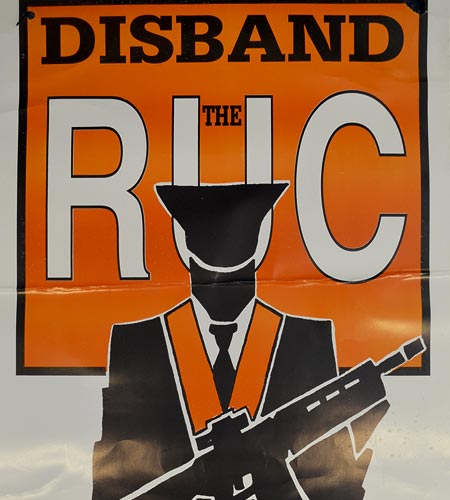Description
A Sinn Féin poster depicting a policeman wearing an Orange Order sash. Every year, there are hundreds of parades in Northern Ireland. The majority of marches are organised by the Orange Order. Most of these parades are peaceful, however those that enter Catholic areas can end in public disorder. The 1987 Public Order (Northern Ireland) Order legislation enabled the Royal Ulster Constabulary (RUC) to reroute marches that had the potential to cause serious public disorder, damage to property or disruption to life or community.
In 1995, the police decided to reroute the Drumcree Orange Order parade away from the Garvaghy Road, in Portadown. After a three day stand off, compromise was reached when the Catholic residents let a procession of silent marchers down the road. In 1996, the Orange Order took an uncompromising stance and refused to negotiate with residents or reroute the Drumcree parade. The chief constable decided to ban the march from the Garvaghy Road. Four thousand Loyalists gathered at the police blockade and began a stand-off. Loyalist violence erupted throughout Northern Ireland; violent riots broke out, schools, churches and houses were attacked and roads were blocked with burning hijacked vehicles. After three days of protest, a heavy excavator appeared behind the Loyalist barricade and the number of protestors increased to 10,000. Additional troops were deployed but there was not enough manpower to keep roads open, disperse rioting mobs and hold the line at Drumcree. The RUC feared that the Orangemen would break through the police cordon. The following day, the chief constable gave the order to push the Orange march down the Garvaghy Road, without consulting the residents. Nationalists were shocked and enraged and rioting erupted in Catholic communities across the Province.
Events at Drumcree seriously damaged Nationalist trust and confidence in the police. The RUC, which contained members of the Orange Order, were accused of a lack of impartiality and six officers were suspended from duty. The chief constable was criticized for misjudging the Loyalist response to the ban, inadequate planning and failure to uphold the rule of law.


